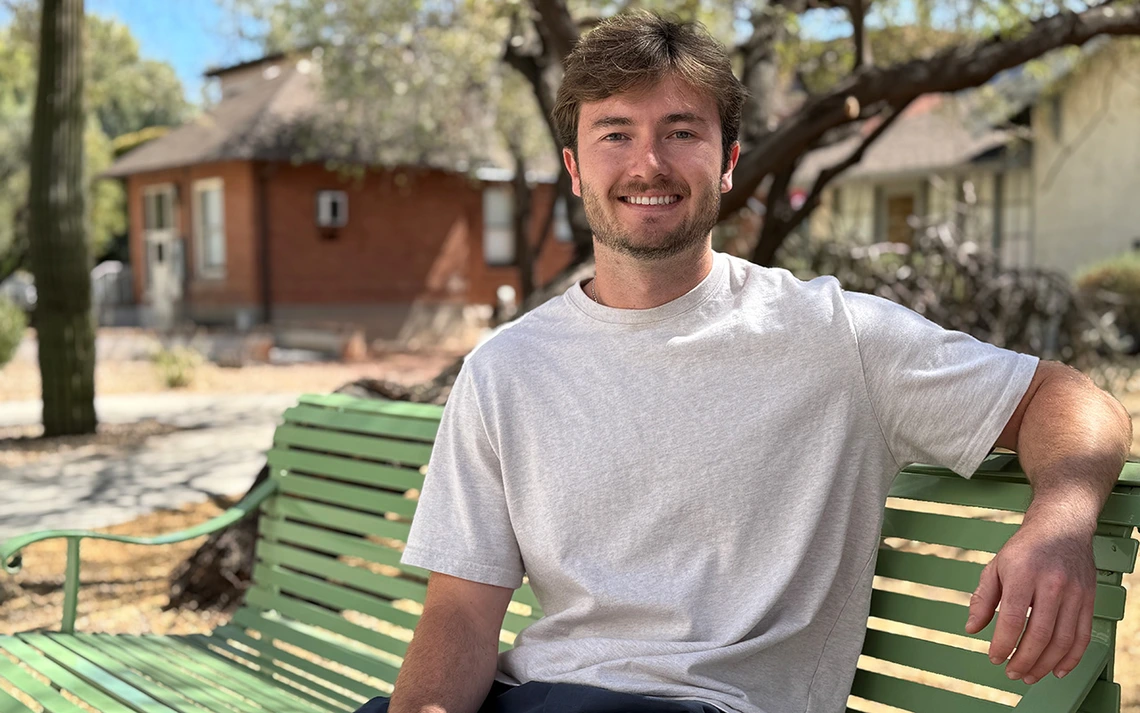Graduate’s soil-less, vertical farming heads to market

Chemical engineer Justin Smith leaves the University of Arizona Interdisciplinary Capstone program with a degree, advanced skills and funds to pursue a novel business venture.
Justin Smith, who graduated with a bachelor’s in chemical engineering in May 2025, is entering the workforce with ambitious plans. In his senior year he founded a startup, Lazy Towers. He is moving a soil-less, vertical farming system toward the market to reduce labor and improve space efficiency in greenhouses.
Tech Launch Arizona’s student resources hub, Startup Wildcats, has been instrumental in connecting the young company founder with investors. In fact, he received $1,250 at the 2025 TLA Startup Night on Feb. 18 to build out his prototype.
While working on his startup plans, Smith completed his capstone project with Team 25069. The Department of Chemical and Environmental Engineering sponsored the team to develop a renewable energy source from corn waste.
Read on to learn what motivates Justin Smith.
Q & A
Where do you get your entrepreneurial spirit?
I’ve always sold things on the side, trying to make a little money anywhere I can. As a kid, my mom would buy snacks I enjoyed, and I would resell them to kids in my class at a markup. I provided a service, I benefited, and they benefited.
What inspired you to start Lazy Towers?
Joel Cuello, professor of biosystems engineering, assigned each student a box inside the Data Center Building and tasked us with making it as efficient and productive as possible.
So that made me go, “All right, let's problem solve.” I've always been interested in designing different ways to grow food, and I had an idea in 30 minutes! I knew I was going to start an agriculture business.
How does the product improve farming?
The main problem it solves is space efficiency. It will be even more dense than traditional greenhouses. And traditional greenhouses are already 20 times more dense than traditional farming.
I'm also trying to reduce labor and water usage. I can create an easier process for a worker, and use automation to help them.
Why is this better than traditional farming?
The system is designed to create smaller micro farms, spread across cities. This approach reduces transportation and distribution needs, which lowers the carbon footprint and production costs. With hydroponics and aquaponics we can cut water usage by 90% compared with traditional farming. And since we won’t use pesticides, everything will be fully organic.
How did Startup Wildcats help get your business off the ground?
They gave me a lot of confidence. I did over 20 fundraising interviews, and I learned ways to be more concise with what I wanted. The funding helps significantly, especially in recuperating the costs I've already put into my project.
What did your capstone project accomplish, and what was your role?
The project focused on bioethanol production from agricultural waste. We took corn husks, straw and various materials that you don’t eat to produce fuel.
My biggest challenge was to find a pre-treatment method that was the most sustainable. We used no chemicals, so we could give our processing waste to pigs for food.
How did the capstone experience support your business goals?
It helped me understand economics. This project looked at all the money associated with production, like planning, building, water demands, initial costs and electricity. It was an eye-opener.

